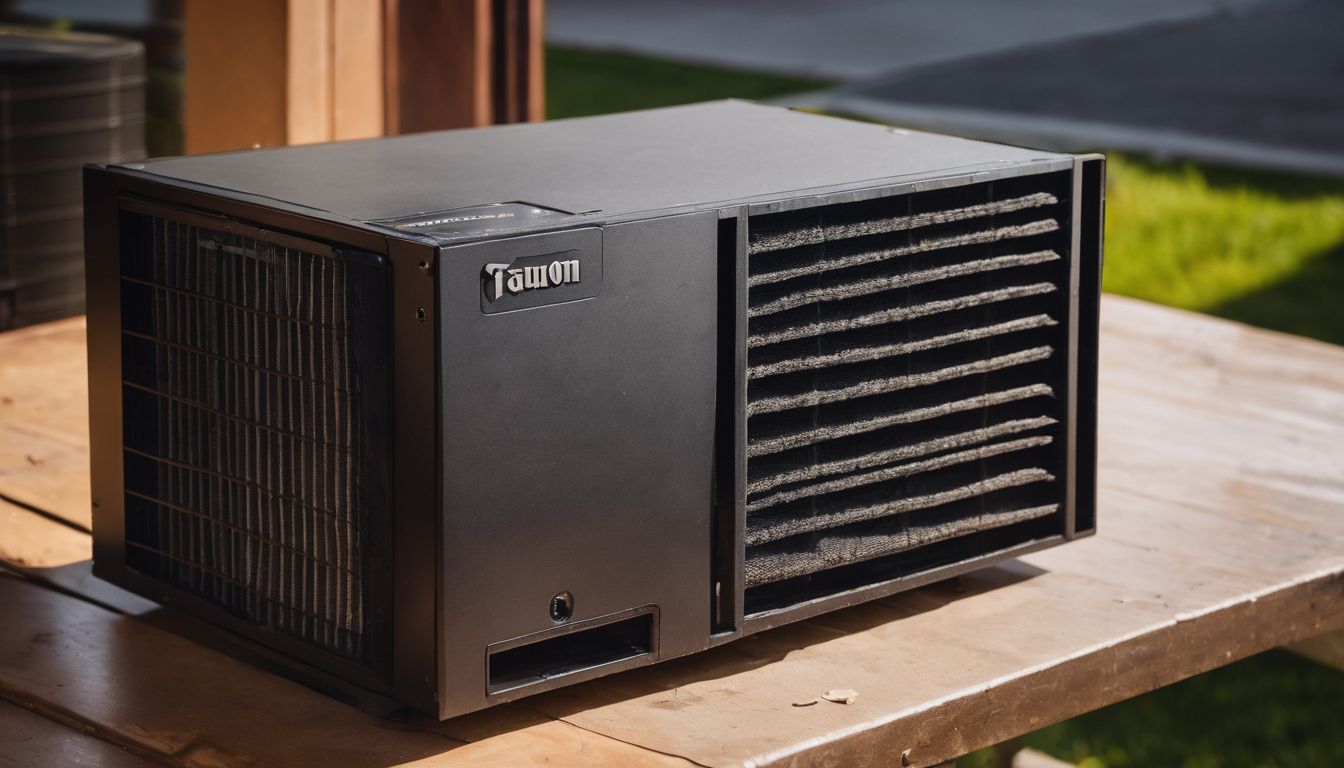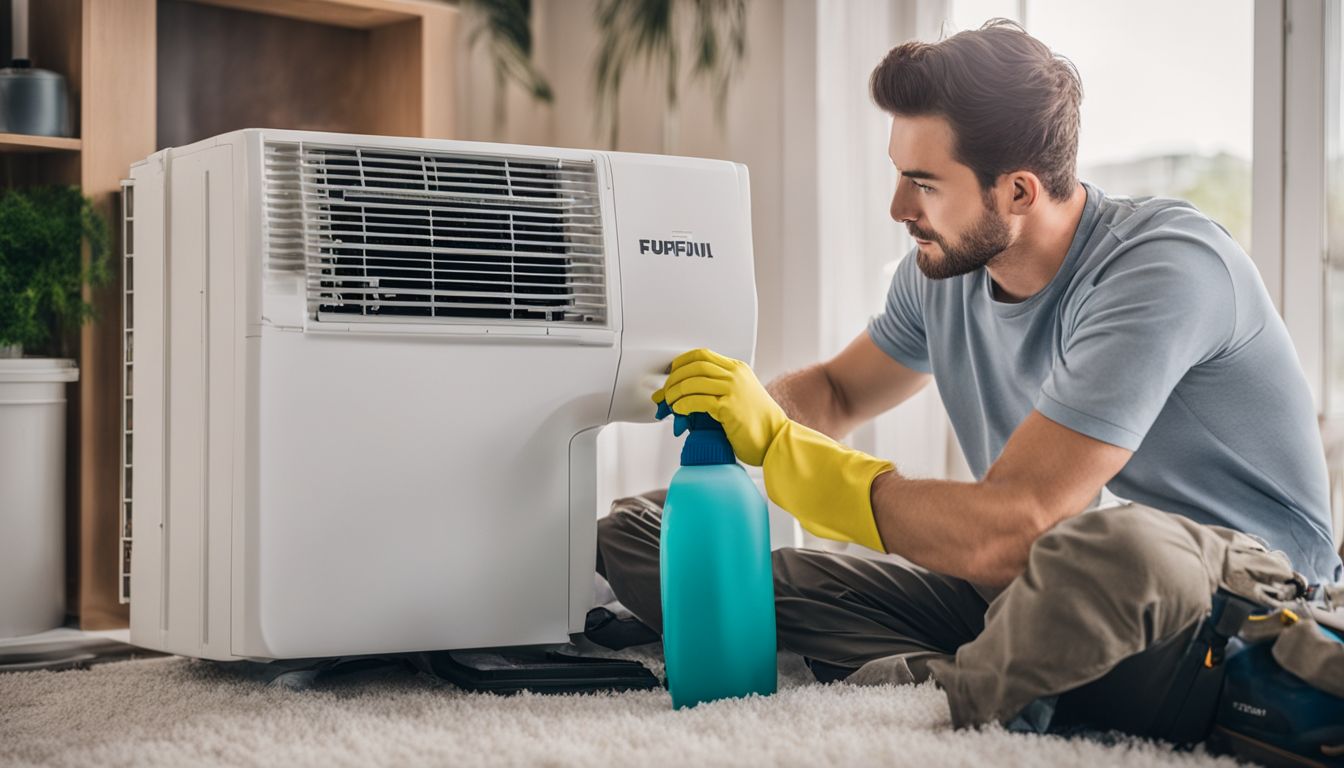Is your air conditioner struggling to keep you cool? A dirty AC filter might be limiting airflow. Our blog will guide you through common culprits and smart fixes for an underperforming air conditioning system.
Keep reading – it’s time to chill out!
Understanding Air Conditioners
Air conditioners work by moving heat from inside to outside your home. They use a chemical called refrigerant that absorbs room warmth, turning it into a gaseous state within the evaporator coil.
As this gas moves through the air conditioning system, it passes over condenser coils where it loses its heat and turns back into a liquid. This cycle keeps repeating, keeping rooms cool and comfortable.
Central air systems are more complex than single-room units because they have to cool larger areas evenly. They consist of an outdoor unit containing the compressor and condenser coil, while the indoor unit holds the evaporator coil and blower.
Split-system air conditioners separate these components even further for greater energy efficiency. For each type, proper AC maintenance is critical to ensure that every part functions well without causing cooling issues or strange noises from AC units due to neglect or dirt buildup.
Common Reasons for AC Not Cooling
Exploring the heart of your air conditioning woes, we’ll delve into various factors that can prevent your unit from delivering that much-needed cool breeze. From technical glitches to routine wear and tear, several culprits could be causing your AC’s lacklustre performance.
Inadequate Refrigerant Level
If your AC is not cooling, it might be due to an inadequate refrigerant level. Refrigerants are essential for absorbing heat from the air inside your home and releasing it outdoors, a process central to any air conditioning system.
Over time, leaks can develop in the copper tubing that holds the refrigerant, causing levels to drop. A lower-than-required amount of refrigerant means your AC can’t effectively remove heat, leaving you with warm indoor air.
Detecting and fixing a refrigerant leak isn’t something most homeowners should tackle themselves – it’s a job for professionals with the right tools and safety knowledge. They’ll locate any leaks, seal them up and refill the refrigerant to its proper level.
Ensuring your unit has the correct amount of coolant is crucial for maintaining cool and comfortable temperatures in your home. Regular checks by an HVAC technician as part of routine maintenance can keep refrigerant issues at bay before they become bigger problems that affect your comfort during hot weather periods.
Dirty or Clogged Air Filter
Having a dirty or clogged air filter in your central air conditioning system can significantly impact its cooling efficiency. As dust and debris accumulate, they restrict the airflow necessary for maintaining comfortable temperatures.
Without proper air flowing through the evaporator coils, your AC unit struggles to absorb heat from your home’s interior, causing it to underperform.
Regularly replacing or cleaning the air filters ensures your HVAC system doesn’t overheat due to excessive strain on its components. Not only does this help keep the cool air coming, but it also extends the life of your entire heating and cooling system by preventing unnecessary wear and tear on parts like the furnace and condensate drain lines.
Maintaining clean filters is a simple yet critical step toward achieving optimal performance from your air conditioner.
Faulty Compressor
A faulty compressor spells big trouble for your air conditioning unit. It’s the heart of your system, pumping refrigerant through the coils to cool the air inside your home. If this critical component begins to fail, you’ll notice it straight away because your central air conditioner will struggle to deliver that refreshing chill.
Signs of a compressor problem can include strange noises coming from the AC or simply no cold air blowing out. Without proper circulation of refrigerant, courtesy of a fully functioning compressor, your living spaces won’t stay cool, especially as outside temperatures soar.
Quick action is necessary; ignoring these warning signs could lead to a complete breakdown of your air conditioning systems. Repairing or replacing a bad compressor isn’t something you want to delay since comfort and efficiency are at stake.
Thermostat Issues
Thermostats are vital in regulating your home’s temperature, but if they start acting up, they can throw your whole AC system off balance. Knocking or bumping into the thermostat may inadvertently alter its settings or even damage it internally, leading to cooling issues.
Incorrect thermostat settings might send mixed signals to your HVAC systems, causing them not to cool correctly.
Sometimes the problem is more severe; worn-out or broken thermostats fail to communicate with the air handler unit effectively. This miscommunication means that despite the AC unit running, it doesn’t result in a cooler environment as expected.
Checking and adjusting the thermostat could be a quick fix; however, if inconsistencies persist, replacing the faulty device becomes necessary for maintaining optimal indoor climate control and comfort levels.
Blocked Condenser Coils
Your air conditioner’s condenser coils have a tough job, releasing heat from your home to the outside. Over time, these coils can become clogged with dirt, dust, and debris. This build-up works like an insulating layer, trapping heat and hindering the cooling process.
Your AC ends up working harder but struggles to keep you cool.
Keeping condenser coils clean is vital for efficient operation. Blockages restrict airflow – a leading cause of condenser problems as highlighted in our important facts section. Regular vacuuming around the unit helps prevent dirt accumulation on these crucial components of your air-con or split system air conditioner.
Simple maintenance steps can ensure unobstructed airflow and better performance over time.
Dealing with Unpleasant Odors: Common Air Conditioner Causes
Mould and mildew inside your air conditioner can create a musty smell that spreads throughout the room. These fungi thrive in damp environments, often due to excess moisture from frozen evaporator coils or stagnant water in the AC’s drain line.
Regularly cleaning or replacing your dirty air filter can prevent mould growth and eliminate this common source of bad odours.
Refrigerant leaks not only hinder your AC’s cooling ability but also result in a sweet, chloroform-like scent that indicates a serious issue needing immediate attention. Similarly, pollutants trapped by a blocked filter can lead to unpleasant smells over time.
Burnt components within the unit emit an acrid odour, signalling potential wiring problems or failed parts that require professional servicing. Keeping an eye out for these signs helps maintain clean and healthy indoor air quality, free from disruptive scents.
Diagnosing Problems with Your Air Conditioner
If your air conditioner isn’t cooling as expected, first check the air filters. Dust and debris can easily clog these filters, restricting airflow and hindering performance. Replace or clean them regularly to keep your AC running smoothly.
Next, examine the compressor; it’s vital for pumping refrigerant through the system. A malfunctioning compressor means your AC won’t be able to produce cool air.
Take a look at your refrigerant levels too. Insufficient refrigerant due to leaks or undercharging will affect the cooling efficiency of your unit. Consider whether coils are blocked with dirt—their cleanliness is essential for transferring heat out of your home efficiently.
Ensuring proper installation and routine checks can help detect issues early on, heading off more significant problems that could impair your AC’s operation.
Also, give some attention to room size and ductwork when diagnosing issues with an air conditioner not cooling properly. An oversized or undersized unit may struggle to maintain desired temperatures effectively within a given space; meanwhile, poorly connected or leaking ducts can result in lost cooled air before it reaches its destination within your home environment.
Lastly, do not overlook thermostat settings—a faulty thermostat might prevent correct temperature regulation, leading to inconsistent performance from the system, including heat pumps and mini-split setups.
Possible Solutions for AC Not Cooling
To combat the sweltering heat effectively, ensure your air conditioner receives timely maintenance and consult professional repair services at the first sign of trouble. Addressing issues promptly can restore your unit’s efficiency and keep you cool when you need it most.
Regular Maintenance
Regular maintenance is the key to keeping your air conditioner running smoothly and preventing issues that reduce cooling efficiency. By scheduling routine check-ups, technicians can detect refrigerant leaks early, ensuring that your system has enough of this vital substance to function as an effective air cooler.
They will also thoroughly clean any dirty or clogged filters, allowing clean air to flow freely and maintain a comfortable humidity level inside your home.
Technicians keep an eye out for potential problems such as frozen coils or compressor malfunctions during these visits. They work hard to ensure each part of your AC unit, from the fridge-like radiator to the outdoor condenser coils, operates at peak performance.
This proactive approach not only enhances cooling power but also extends the lifespan of your air conditioning system significantly.
Professional Repair Services
Calling on professional repair services is essential when your AC fails to cool. These experts have the tools and know-how to diagnose complex issues, like a compressor that’s not working properly or refrigerant levels that are too low.
They can thoroughly clean your unit’s components, ensuring nothing hinders its performance.
If your air conditioner requires a refrigerant refill, it’s crucial to have trained technicians take care of it. Incorrect handling of refrigerants can be harmful and may lead to further cooling problems or even system damage.
Professionals will check the level accurately and perform a safe refill, restoring your AC’s ability to cool effectively without risking any damage or hazards.
Conclusion
As we’ve explored, various issues can prevent your AC from cooling efficiently. Regularly checking components like filters and refrigerant levels is crucial for peak performance. If you encounter persistent problems, don’t hesitate to seek professional help.
Remember, proactive care keeps your air conditioner in top condition throughout the year. Stay cool by addressing these common culprits promptly!
If you’re also experiencing a foul smell along with cooling issues, be sure to read our guide on dealing with unpleasant odours in air conditioners.
FAQs
1. Why might my AC stop cooling effectively?
Your AC may not be cooling properly because it might need to refill the refrigerant, or there could be other issues with the system.
2. How often should I check the refrigerant levels in my AC?
You should have a professional inspect your AC’s refrigerant levels regularly to ensure it’s working efficiently.
3. Can refilling refrigerant fix all cooling issues in an AC?
Refilling the refrigerant can solve some cooling problems, but if there are additional faults within your AC unit, further repairs might be needed.
4. What signs indicate that my AC needs more refrigerant?
If your air conditioning unit is blowing warm air, producing hissing noises, or forming ice on its components, it may be time to refill its refrigerant.





